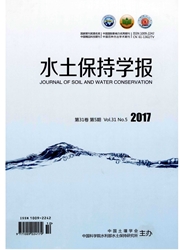

 中文摘要:
中文摘要:
为揭示冻融循环对土壤物理性质及抗冲性的影响,以内蒙古坡耕地风沙土为研究对象,控制冻融循环次数(0-10次)和土壤质量含水量(6%,9%,12%)2个因素,在室内模拟野外冻融循环和径流冲刷过程,定量分析冻融循环对土壤含水量、容重、孔隙度及土壤抗冲性的影响规律。结果表明:(1)土壤含水量随冻融循环次数增加呈缓慢增加的趋势,增加幅度为0.51%-0.87%,且高含水量土壤增幅比低含水量土壤大;(2)随冻融循环次数的增加,土壤容重和孔隙度分别呈缓慢减小和增大趋势,且变化幅度逐渐降低,最后达到基本稳定的状态,达稳定状态后的土壤容重比未冻融土壤小(0.05±0.01)g/cm-3;(3)当冻融循环次数相同时,高含水量(12%)的土壤容重比低含水量(6%)小,而孔隙度和土壤抗冲性的降低幅度与之相反;(4)冻融循环次数对风沙土抗冲系数具有显著影响,试验土样抗冲性随冻融循环次数的增加呈显著降低趋势,但是第6次冻融循环后,试验土样的含水量、容重、孔隙度及抗冲性的变化均逐渐趋于稳定。研究结果可为季节性冻融区土壤侵蚀机理研究提供参考。
 英文摘要:
英文摘要:
Freeze-thaw cycle is one of the significant characteristics of soil thawing process in the area of seasonal freeze-thaw. In order to reveal the influence of freeze-thaw cycles on soil physical properties and soil anti-scouribility, aeolian sandy soil collected in a sloping farmland in Inner Mongolia was taken as the research object. Two factors of freeze-thaw cycles (0 to 10) and soil water content (6%, 9% and 12%) were controlled to simulate field freeze-thaw cycles and the runoff scouring process. The influence of freeze-thaw cycle on soil water content, bulk density, porosity, and soil anti-scouribility was analyzed quantitatively. The results showed that. (1) Soil water content increased with the increasing number of freeze-thaw cycles, and was increased by 0.51- to 0.87-. The increasing extent for the soil with high water content was greater than for the soil with lower water content. (2) With the increasing number of freeze-thaw cycles, soil bulk density and porosity were decreased and increased slowly, respectively, with the extent of change decreasing gradually, and finally reached a basically stable state, under which soil bulk density was 0.05+0.01 g/cm lower than the soil not subjected to freeze-thaw; (3) When the soil had the same numbers of freeze-thaw cycles, soil bulk density of the soil with high water content (12%) was greater than that of the soil with low water content (6%), but the porosity and soil anti-scouribility showed the opposite trend (4) The number of freeze-thaw cycie had a significant effect on soil anti-scouribility. Soil anti-scouribility significantly decreased with the increasing number of freeze-thaw cycles. However, after sixth freeze-thaw cycle, thechange of water content, bulk density, porosity, and soil anti-scouribility gradually decreased. The results can provide a reference for studying the mechanism of soil erosion in the seasonal freez-thaw area.
 同期刊论文项目
同期刊论文项目
 同项目期刊论文
同项目期刊论文
 期刊信息
期刊信息
